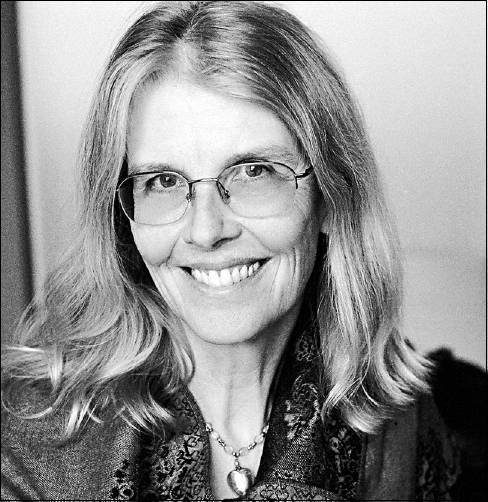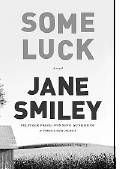Planting the seed of a trilogy
Jane Smiley’s first novel in her “Last Hundred Years” series begins in the farm fields of Iowa.
Pasted to and stuck between pages of my grandmother’s 1927 Farmer’s Guide Cook Book are instructions for making soap, planting by the moon, canning strawberries, and curing coccidiosis in chicks; a poem called “My Mother,” and a postcard from a son who died young; an overdue bill for her subscription to Pathfinder magazine, on which is scrawled a recipe for Never Fail Cake Icing. Her annotated book is a kind of biography; as an artifact, it’s a window into the practices and politics of a particular time, place, and people in American history.
Reading Some Luck, the first book in Jane Smiley’s “The Last Hundred Years” trilogy, is like being handed such an heirloom. Though the series title and family tree in the opening pages herald an epic, Smiley organizes her story as a practical almanac, recounting the period from 1920 to 1953 in chapter-long years. The narrative tone of familiarity (“Well, he had planted fescue, it looked like”) honors both historical events and everyday details in the life of the Langdon family of Denby, Iowa.
Walter Langdon, 25, has survived combat in Cambrai, France, and the influenza that took his brother Howard at home on the family farm. Two years after the end of World War I, Walter has his own land and 10 milk cows. He’s married to Rosanna and has a son, Frank. Milk prices are down; he’s lucky to break even on his oat crop. His anxiety is the punch line to the joke the men tell at threshing and harvest time, about the farmer who wins a million dollars in the lottery and farms until the money’s gone.
Smiley returns to the Iowa fields of her Pulitzer Prize-winning A Thousand Acres to cultivate concerns she’s also worked in Private Life and The All-True Travels and Adventures of Lidie Newton: cultural change wrought by technology, capitalism, and collectivism, and the historical forces that affect families.
There’s an echo of Charles Dickens in her indictment of the idea of man as an economic unit, his work perfected (and replaced) by machine. Though Walter measures his progress by comparing his fields to those he passes on the way to church, he’s closer to a laborer than a landowner. In Mason City to hear evangelist Billy Sunday speak, he bitterly resents paying 75 cents for two boiled eggs for breakfast when the Denby grocer buys Walter’s eggs for three cents each.
“People in town had too much time on their hands,” he thinks, “so they built themselves stores and picture shows and even parks, just to be doing something. But really they weren’t doing anything. Just using up stuff.”
Dickens believed education was the answer to inequity; Smiley is more skeptical. Walter’s sister-in-law Eloise, who went to college and became a communist, is interrogated by the California Un-American Activities Committee. His youngest son, Henry, is blissfully ignorant about farm economics and politics, burying himself in Beowulf at the University of Iowa.
Every one of the characters inhabiting Some Luck has a story, and part of the pleasure — the tension
— of reading comes from knowing the outcome of certain trajectories. When Walter worries about planting too many oats or about the “length of the supply line” he won’t extend beyond Chicago, we fear for his future but recognize his prescience about ours. Lecturing his sons when a neighbor buys the town’s first Farmall tractor, he sounds like a spokesman for the modern sustainable agriculture movement. His horses sow their own oats as they pull the plow and planter, “fix their own supper” by pulling the thresher and hauling harvested oats to the barn, and fertilize the field with their manure.
“Where does Mr. Frederick go to get gas for the tractor?” he asks them. “Texas. And, boys, if you have to go to Texas for something, you don’t need it.”
Thirty-three years and four more kids later, Walter has made what he considers a pact with the devil, buying a Farmall and then a John Deere. He plants clover in cornfields for government subsidies. While his children progress through the new high school, learning about “all the other revolutions there had been and would soon be,” Walter switches from manure to potassium nitrate fertilizer, from Republican to Democrat, from distracted father to doting grandfather. Smiley evokes a whole world through such details, which build to confirm and refute the reader’s expectations of character as fate.
“That was life, as far as Walter was concerned,” she writes of her novel’s patriarch. “You surveyed the landscape and took note of what was needed, and then you did it, and the completed tasks piled up behind you like a kind of treasure, or at least evidence of virtue.” Smiley’s novel is a treasure. I suspect readers will happily plow through 800 more pages as the story is delivered in its three parts.
Contact Elizabeth Mosier at www.elizabethmosier.com.

